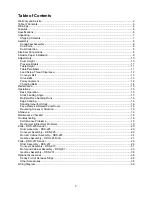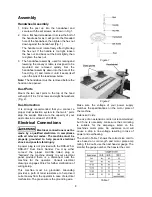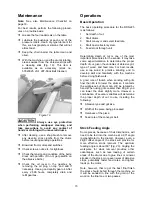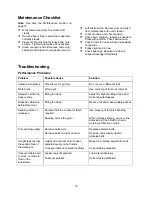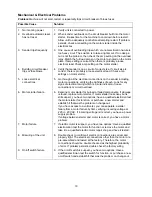
4
Warnings
1. Read and understand the entire owner's manual before attempting assembly or operation.
2. Read and understand the warnings posted on the machine and in this manual. Failure to comply with
all of these warnings may cause serious injury.
3. Replace the warning labels if they become obscured or removed.
4. This drum sander is designed and intended for use by properly trained and experienced personnel
only. If you are not familiar with the proper and safe operation of a drum sander, do not use until
proper training and knowledge have been obtained.
5. As with all machines, there is a certain amount of hazard involved with the use of this drum sander.
Use the machine with the respect and caution demanded where safety precautions are concerned.
When normal safety precautions are overlooked or ignored, personal injury to the operator can result.
6. Do not use this drum sander for other than its intended use. If used for other purposes, WMH Tool
Group disclaims any real or implied warranty and holds itself harmless from any injury that may result
from that use.
7. Always wear approved safety glasses/face shields while using this drum sander. Everyday
eyeglasses only have impact resistant lenses; they are not safety glasses.
8. Before operating this drum sander, remove tie, rings, watches and other jewelry, and roll sleeves up
past the elbows. Remove all loose clothing and confine long hair. Non-slip footwear or anti-skid floor
strips are recommended. Do
not
wear gloves.
9. Wear ear protectors (plugs or muffs) during extended periods of operation.
10. Some dust created by power sanding, sawing, grinding, drilling and other construction activities
contain chemicals known to cause cancer, birth defects or other reproductive harm. Some examples
of these chemicals are:
•
Lead from lead based paint.
•
Crystalline silica from bricks, cement and other masonry products.
•
Arsenic and chromium from chemically treated lumber.
Your risk of exposure varies, depending on how often you do this type of work. To reduce your
exposure to these chemicals, work in a well-ventilated area and work with approved safety
equipment, such as face or dust masks that are specifically designed to filter out microscopic
particles.
11. Do not operate this machine while tired or under the influence of drugs, alcohol or any medication.
12. Make certain the machine is properly grounded.
13. Except for the feed rate control, make all machine adjustments or maintenance with the machine
unplugged from the power source. A machine under repair should be RED TAGGED to show it must
not be used until maintenance is complete.
14. Before turning on machine, remove all extra equipment such as keys, wrenches, scrap, and cleaning
rags away from the machine.
15. Keep safety guards in place at all times when the machine is in use. If removed for maintenance
purposes, use extreme caution and replace the guards immediately.
16. Check damaged parts. Before further use of the machine, a guard or other part that is damaged
should be carefully checked to determine that it will operate properly and perform its intended
function. Check for alignment of moving parts, binding of moving parts, breakage of parts, mounting
and any other conditions that may affect its operation. A guard or other part that is damaged should
be properly repaired or replaced.
17. Provide for adequate space surrounding work area and non-glare, overhead lighting.
Summary of Contents for DDS-225
Page 26: ...26 Motor Cabinet Assembly DDS 225 ...
Page 28: ...28 Gearbox Assembly DDS 225 Drum ...
Page 37: ...37 Gearbox Assembly DDS 237 ...
Page 39: ...39 Wiring Diagram DDS 225 Sander ...
Page 43: ...43 Notes ...



